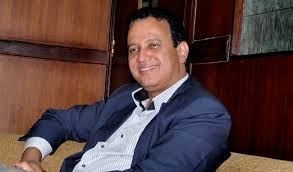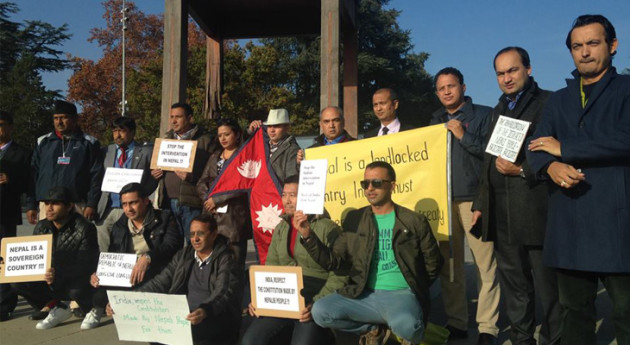All sectors in Nepal are virgin in terms of investment: former NRNA President Jiba Lamichhane
 Jiba Lamichhane is one of the founder members and former President of the Non Resident Nepali Association (NRNA), a global organization of Nepalese residing abroad. He graduated from Moscow State University of Civil Engineering in 1992 and has more than 25 years of extensive national and international entrepreneurial experience. He has been running enterprises in Nepal and Russia and is also associated with a number of social and charity organizations both at home and abroad. Currently he has been playing active role to expose India’s blockade to Nepal at the international level. At a time the country is passing through a difficult time, Nepalekhabar.com interacted with Lamichhane about the current situation, what the country should focus on in coming days and role of NRNs for the development of the country. Here are the excerpts:
Jiba Lamichhane is one of the founder members and former President of the Non Resident Nepali Association (NRNA), a global organization of Nepalese residing abroad. He graduated from Moscow State University of Civil Engineering in 1992 and has more than 25 years of extensive national and international entrepreneurial experience. He has been running enterprises in Nepal and Russia and is also associated with a number of social and charity organizations both at home and abroad. Currently he has been playing active role to expose India’s blockade to Nepal at the international level. At a time the country is passing through a difficult time, Nepalekhabar.com interacted with Lamichhane about the current situation, what the country should focus on in coming days and role of NRNs for the development of the country. Here are the excerpts:
What are you doing these days and how do you see the current situation of Nepal?
I am busy in my regular work spending time in my business and with family. Similarly, I have been involved in areas of my interest like travelling, studying, writing and affiliation with different social organizations.
I am taking the current situation of the country very seriously. Unlike our expectation that the country will move towards political stability and economic development with the promulgation of the new constitution, the country is moving towards a difficult juncture, which is very unfortunate. The agitating groups of Madhesh are Nepalese, so the issues raised by them should be resolved through talks. However the Indian interference in the name of Madhesh movement will not be acceptable to any Nepali.
As you have experience in different countries how do you evaluate the new constitution of Nepal?
I have studied all the articles of new constitution very thoroughly and found that the new constitution is very liberal and has incorporated all relevant issues. The new constitution is very liberal on the issue of citizenship. Some people and political parties have been trying to mislead people about the issue of citizenship.
India is trying to impose some issues which are not even practiced there. Although the issue of representation on the basis of population seems good in theory, it is not feasible for a country like ours with this type of geography. Let’s take an example, the population of Sikkim is 600 thousand and there is one representative from Sikkim in India’s parliament, while the population of Uttar Pradesh is 210 million and it has 80 seats in the lower house. If representation was made on the basis of population, UP should have 350 members in the parliament. There is same situation in other states as well.
The issue of naturalized citizenship is the same as India itself put some restrictions for such citizenship. Except for a few countries of the world, most of the countries have put some restriction for people holding naturalized citizenship. It is not difficult to understand the intention behind advocating for a naturalized citizenship holder to get the chance to hold top posts like President and Prime Minister.
As Nepal has passed through a long period of political uncertainty and tension, what could be the priority of the country in the days to come?
Now the main priority for us should be sustainable peace, political stability and economic prosperity. We have had a political revolution and now it is the time for an economic revolution. We have experienced and also learned from the history of other countries that political change will not be sustainable without economic revolution and economic prosperity.
Are you optimistic that the country will move towards prosperity in the days to come?
I am very much optimistic as the current uncertainty is a temporary phenomenon. I can see much possibility here as all the sectors are virgin in terms of investment. I am confident that we could see a prosperous Nepal within our life time.
What could be the priority of Nepal for the economic development of the country?
Some sectors should be prioritized for economic development. For example Lenin highly prioritized the campaign of electrifying Russia after the October revolution of 1917. After the campaign, the country moved forward towards industrialization and other areas. The importance of hydropower is more pertinent in the 21st century, so we should prioritize hydropower development utilizing the immense water resources of the country. With the development of hydropower, it will be easy for the development of other sectors like tourism and agriculture, which are the backbone of our economy.

Lamichhane participating in a protest program organized in Geneva against India’s blockade to Nepal.
Do you feel that the government is supportive to address the concerns of NRNs and what could be done to create conducive environment for NRNs to invest their capital and skills for the development of the country?
I have found that the state is very positive towards our issues. We raised the issues of establishing our identity, expanding our organization, keeping the special identity of being Nepalese and for some policy related concessions. Although all of our expectations have not been met, the majority of them have been fulfilled. I have been reiterating that as we get our issues resolved by the state, it is our turn to contribute back. Our identity, recognition and self-esteem are in our hands. Former US President John F. Kennedy had stated ‘ask not what your country can do for you – ask what you can do for your country’. We have reached the current status due to contribution of our parents, teachers, relatives, society and motherland. The motherland also has some stake in the achievement we attained. The confidence and respect towards us will depend on how much we have been able to contribute to the motherland.
What could be the role of NRNs for the development of the country as currently they are blamed for making very few investments in comparison to their capacity?
NRN is the community of Nepali people who are in other countries for various reasons but they are emotionally attached with Nepal. The blame might have come as this is the first generation of Nepali Diaspora and it could not fulfill the people’s aspiration. As most of us ourselves are struggling abroad and trying to get established, we are not in a position to do more for our motherland despite our wishes. We did not have the capacity of making huge investment and social contribution, so people should realize this fact. I feel that there is a higher expectation than our capacity. We are not in a position of making huge investments for drastic economic change. We still have a long way to go for it.
It is said that NRN is gradually turning into the club of rich people. How do you react as it was alleged that there was influence of money in the election of NRNA.
I do not fully agree with this statement. Although there is hold of entrepreneurs in the leadership of the organization, NRNA is the common platform of all Nepalese residing abroad. It might have become so as this is the initial stage of establishment of the organization and people at the leadership level have to contribute a lot in their personal capacity. However, the foundation of economic stability of the organization is being made, so there is possibility of people from every sector who have contributed to the organization to reach the leadership of the organization.
Some of the issues which surfaced during the NRNA conference and election held in Kathmandu in October this year should be corrected in the days to come.
(Editor’s Note: How do you find this interview? Please send your feedback to editor@nepalekhabar.com. Nepalekhabar.com believes that NRNs are the pillars for the development of the country. To recognize their contribution we have separate NRN section, so you can express your views and inform about your events from across the globe. Please contact us at editor@nepalekhabar.com)

